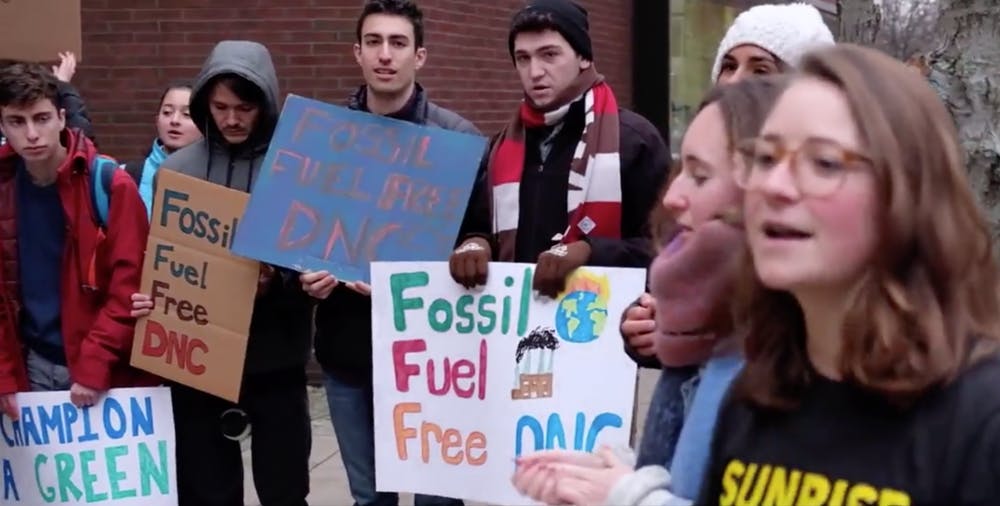The crowd outside the Watson Institute for International and Public Affairs grew steadily as students arrived to join the chorus of voices singing and chanting for climate justice Monday afternoon.
Inside and outside Watson, students disrupted a panel discussion between Democratic National Committee Chair Tom Perez ’83 P’18 and former Republican National Committee Chair Michael Steele to demand that Democratic leaders reject campaign donations from the fossil fuel industry and champion policies to combat climate change, said Lauren Maunus ’19, a lead organizer of the protest. After more protestors walked out of Perez’s event in the Joukowsky Forum, the crowd of students calling for action on climate change expanded to 70 people.
https://youtu.be/YfJ6LKaQU9w
Over the summer, Perez spearheaded a DNC resolution to reject donations from the fossil fuel industry. But two months later, Perez led the DNC to overturn its ban on campaign contributions from the fossil fuel industry, Maunus said in a speech to the crowd of protestors.
Perez stated the DNC reversed its ban on money from fossil fuel industries after labor advocates described the original decision as “an attack on the working people in these industries," The Hill reported.
“We are saying enough is enough,” Maunus told The Herald. “No more fossil fuel money. You can’t be a champion for climate change and still be taking money from this industry any longer.”
Students in the crowd outside Watson held banners that read “Fossil Fuel Free DNC” and “DNC: Stand with People, Not Corporations.” The crowd chanted, “Hey, hey! Ho, ho! Fossil fuels have got to go!” Other banners said “Green Jobs For All” and “Champion a Green New Deal.”
The protesters assembled to demand that Perez reinstate the DNC’s ban on fossil fuel money and include a plan for a Green New Deal into the Party’s platform for 2020, Maunus said.
A Green New Deal would transition the United States to renewable energy over the course of the next decade and provide green jobs to workers displaced by the transition, Galen Winsor ’22 told The Herald.
Winsor led the protesters in songs and chants while people entered Watson to hear Perez and Steele speak. The crowd invented lyrics related to climate justice using tunes ranging from old gospel songs to contemporary songs like “Blessings” by Chance the Rapper, Winsor told The Herald. “Music is a really powerful way to bring people together and send a message that’s uplifting,” he added.
A number of student protesters delivered speeches on the dire threat posed by climate change. Speakers pointed to deadly wildfires in California, barrages of devastating hurricanes, air pollution in Indonesia that affected the whole subcontinent and desertification in Mali as evidence of climate change’s destructive impact. Some speakers shared deeply personal stories of their experiences with these disasters.
“We are seeing the impacts of climate-fueled disasters as we speak,” Maunus said in her speech, referring to the wildfire currently ravaging California. The death toll from the fire has risen to 79, and around 700 people are missing, according to CBS News.
“We cannot afford the fires in California that have created hell in the town of Paradise,” Dana Kurniawan ’22 added. The ongoing wildfire reminded her of the toxic air in her home country of Singapore which was created by the controlled burning of forests in Indonesia. “No one could breathe clean air, not even the oil-hungry executives who ordered the burning,” she said.
When Hurricane Sandy hit New York City in 2012, the city went dark. Buildings flooded. People were displaced from their homes, and many families still have not recovered, said Lily Gordon ’21, a Manhattan resident. “There still is no government plan for when the next flood comes,” she added. “How much longer until Puerto Rico and New York recover from Hurricane Sandy, Maria, Irma, et cetera? For how much longer are we going to worry about the water we drink or the air we breathe, or whether our homes are going to be destroyed?”
Wassa Bagayoko ’21 told the story of how her father left his home country of Mali in the 1980s when the land in his village became unfarmable. “Many Malians are victims of this climate crisis but have done so little to contribute to it,” she said. “Mali isn’t alone in this. Around the world, developing countries suffer the consequences of decades of European and U.S. pollution.”
Speakers at the protest repeatedly emphasized the immediacy of the threat of climate change by citing a recent report released by the Intergovernmental Panel on Climate Change, which states that society’s use of land, energy, transportation and industry must be rapidly transformed by 2030 to prevent extreme global warming. But students also expressed hope that policies aimed at curbing climate change will prevail.
“The politics of climate change are shifting,” Maunus said in a closing speech to the crowd of protesters. “This week has been the biggest breakthrough of climate politics in our lifetime.” She praised Congresswoman-elect Alexandria Ocasio-Cortez for releasing a resolution advocating for a Select Committee on a Green New Deal, which has garnered the support of 11 Congressional Democrats since its release last week.
“We have the momentum, and every day is bringing dozens of new victories,” Maunus said. “But we need to keep pushing right now. We cannot let up because our lives, our homes, our futures depend on it.”

ADVERTISEMENT




